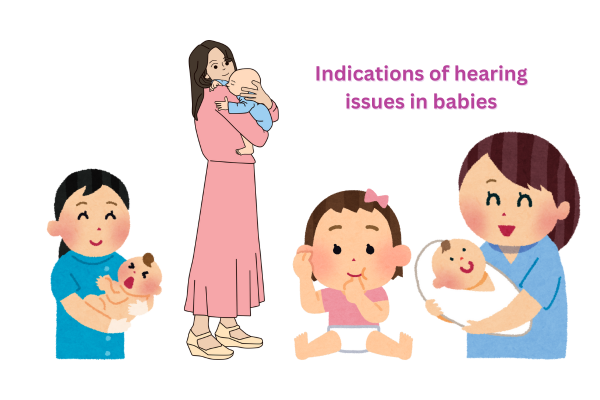Identifying hearing difficulties in infants is crucial for timely intervention and support. Here are some tell-tale signs that may indicate an infant has hearing difficulty:
Behavioral Signs
- Lack of response to sounds: Infants typically respond to loud noises or familiar voices. If an infant doesn’t react, it may be a sign of hearing difficulty.
- No babbling or cooing: Infants usually start babbling and cooing around 6 months. If an infant isn’t making these sounds, it could indicate a hearing issue.
- Not localizing sounds: Infants should be able to locate the source of a sound. If an infant doesn’t turn their head or eyes towards the sound, it may be a sign of hearing difficulty.
Physical Signs
- Fluid or discharge in the ears: Visible fluid or discharge in the ears can be a sign of an ear infection, which can cause hearing difficulty.
- Ear pulling or tugging: Infants may pull or tug on their ears if they’re experiencing ear pain or discomfort, which can be related to hearing difficulty
Developmental Signs
- Delayed speech development: If an infant is not meeting speech development milestones, such as saying first words around 12 months, it may be a sign of hearing difficulty.
- Not responding to their name: Infants should respond to their name by around 6 months. If an infant doesn’t respond, it may indicate a hearing issue.
Other Signs
- Family history of hearing loss: If there’s a family history of hearing loss, it’s essential to monitor an infant’s hearing closely.
- Certain medical conditions: Infants with conditions like meningitis, encephalitis, or cytomegalovirus (CMV) may be at higher risk for hearing difficulty.
If you suspect that your infant may have hearing difficulty, consult with your ENT Specialists, pediatrician or an audiologist for a comprehensive hearing evaluation and guidance.
NOTE:
AS A PREVENTIVE MEASURE, EVERY NEW BORN BABY SHOULD HAVE HEARING SCREENING AT BIRTH TO PICK UP CASES OF HEARING DEFECTS FOR EARLY INTERVENTION BEFORE LANGUAGE DEVELOPMENT STARTS
Share Post On:
Recent Posts
-
Technique of Incision and Drainage of Septal Hematoma/Septal Abscess
-
Upper Aerodigestive Tract Foreign Body Impaction
-
Incision and Drainage of Hematoma Auris
-
Rigid Bronchoscopy for Retrieval of Foreign Bodies in Children
-
Foreign Body Impaction in the Larynx, Trachea, and Bronchi
-
Leadership Position is a Tool, not a Trophy
-
Carcinoma of the Oropharynx
-
Peritonsillar Abscess
-
Ethics of Doctor-Patient Relationship
-
Doctor-Patient Relationship Case Scenarios
-
Asymmetrical Tonsils and Approach to Evaluation and Management
-
Nasal Polyposis
-
Rigid Oesophagoscopy and Complication
-
Anatomy of Oesophagus
-
Stridor, Snoring, Stertor And Wheezing: How They Compare
-
Temporomandibular Joint (TMJ)
-
Otoacoustic Emissions
Categories
Get in Touch
Read doctor-produced health and medical information written for you to make informed decisions about your health concerns.


